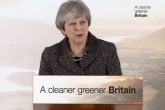Industry welcomes 25 Year Environment Plan but calls for detail remain
The UK waste and resources industry has largely welcomed the government’s 25 Year Environment Plan, although calls remain for more substance to shore up the proposals.
The 25 Year Environment Plan was published today following a speech by Prime Minister Theresa May laying out the government’s vision for the future of the UK’s environment. It contains a number of long-term plans to address key environmental issues, none more eye-catching than the headline commitment to eliminating ‘avoidable plastic waste’ by 2042.
While much of the press coverage in advance of the Plan’s release was dedicated to the issue of plastics, an issue currently at the forefront of the public consciousness and with the Plan’s key policies such as extending the five pence carrier bag levy to all retailers in England, the Plan addresses a range of issues including air quality, restoring woodlands, improving soil health, reducing pollution and ensuring access to green spaces for young people. 
Although a two-year delay to the Plan’s publication has drawn criticism, it appears that this delay has been beneficial to the waste and resources industry. A draft that was almost signed off prior to Michael Gove’s arrival as Education Secretary last summer only contained a small mention of resources, whereas it is now a focal point of the plan and includes actions to tackle food waste, better manage residual waste and crack down on waste crime.
Government taking waste and resources ‘seriously’
“The 25 Year Environment Plan provides some much-needed encouragement to our industry that the government is finally taking seriously both the challenges and opportunities in managing the UK’s resources,” said Jacob Hayler, Executive Director of the Environmental Services Association (ESA). “We welcome the ambitions to double resource efficiency and eliminate avoidable waste by 2050. This will require the concerted effort of the whole supply chain along with policy makers, and the waste and recycling industry is ready to play its part.”
CIWM Chief Executive Colin Church added: “What we have today in the 25-year plan is an ambition to eradicate all avoidable plastic waste in the UK by 2042 and an important commitment to explore how the tax system or charges can be used to further reduce the amount of waste created – an indication that the government’s attitude to using fiscal levers and incentives is changing. At a more fundamental level, the Prime Minister’s assertion that the state must play a key role in protecting the environment... and that ‘where government needs to intervene to ensure high standards are met, we will not hesitate to do so’, is very welcome.
“The sector must now engage fully and proactively with the Government to ensure that these ambitions are translated into meaningful actions and policy measures in the Resources and Waste Strategy that is promised towards the end of year. This strategy must maintain the momentum by setting out concrete measures and timelines for action on many fronts, from strengthening the markets for secondary raw materials, to reforming our Producer Responsibility systems, to reducing single use plastics.
“We are also pleased to see the commitment to helping developing nations tackle pollution and reduce plastic waste, including through UK aid. This is an argument that CIWM has been making at the highest levels recently... Some three billion people across the globe do not have access to controlled waste disposal services and facilities, and research suggests that mismanaged municipal solid waste in developing countries is the major source of plastics entering the oceans. This means that there is significant scope for UK international aid to be better targeted at helping to address this crisis.”
David Palmer-Jones, CEO of SUEZ recycling and recovery UK, also welcomed the Plan, praising its aims to improve the use of data in driving resource efficiency, saying: “Overall, the plan represents an important first step towards policies that will support the growth of our industry and enable it to play a pivotal role in the development of a more resource efficient, sustainable economy. Systemic change is needed to tackle the complex issues facing us and ensure co-ordination with national infrastructure plans and the Industrial Strategy.”
Questions remain
The fact that the Environment Plan was launched by the Prime Minister and not Michael Gove, the Environment Secretary, as previously anticipated, also caught attention, suggesting a real emphasis on the government taking the environment seriously. However, Shaun Spiers, Executive Director of the Green Alliance think tank warned that this high-level talk must become action.
He said: “This was a landmark speech, the first prime ministerial speech on the environment for 17 years. There was much to welcome, particularly Theresa May’s determination to be a world leader in protecting the environment, the commitment to set up a strong new environmental watchdog and the promise of action on plastics pollution.
“Inevitably, questions remain. While the ambition and sense of direction of the 25 Year Environment Plan launched today are admirable, it is less clear how all its good intentions will be put into effect.
“That makes it all the more essential that the government introduces a new Environment Act to underpin its ambitions. We hope to see a commitment to a new Act in the near future.”
More detail needed
While the Plan has been largely welcomed, several parties have lamented the lack of detail in strategy, and are calling for a more consultative approach going forward, especially when developing the Resources and Waste Strategy 2018.
Resource Association Chief Executive Ray Georgeson said: “Many of the signals give encouragement to our industry, but frankly our nation is and should be capable of so much more than this in terms of real time specifics, targets and legislative underpinning.
“Ours is an industry that has grown and responded well to a regulatory framework and target-based approach built over a generation. Current challenges – including climate change, marine plastic pollution, recycling market development in the UK – all require more detail, urgency and intensity than perhaps is expressed in the document.”
More stinging criticism of the Plan came from Michelle Carvell, CEO at Lorax Compliance, who said: “We feel real opportunities have been missed to confirm a consistent, joined-up policy to tackle the UK’s mounting waste crisis which both engages consumers and takes the input and requirements of businesses into account.
“As it stands, the government’s plan is little more than a knee jerk reaction which works as a placeholder prior to the looming policy changes ahead in our post-Brexit landscape. It says very little and promises to deliver even less, with no legal force included in the strategy.
“We urge the government to embrace a more consultative approach going forward, working with businesses to build a clearly defined process to manage the UK’s environmental obligations, as we strive to evolve solutions to this escalating waste catastrophe.”
Recognising the benefits of plastics
While the government’s desire to tackle plastic waste has been widely commended, the plastics industry itself has been noticeably cautious on the matter, supporting the increased recycling and recovery of plastics while stressing their continued importance in the modern world.
Referring to emerging pressures on the plastics recycling industry following Chinese restrictions on waste import, a statement from the British Plastics Federation (BPF) said: “The calls for evidence provide an opportunity to bring about much-needed reform of the regulatory regime currently governing packaging recovery and recycling to nurture a full-blooded domestic recycling culture that is not dependent upon the export of waste for recycling overseas.”
However, the BPF also defended the plastics industry against the invective that many high-profile campaigns have used against it: “The UK plastics industry invented the global plastics industry and a whole pipeline of innovations, including the discovery of polyethylene, have made it a leading player in the global plastics industry. However, we are very disturbed that the tone of language used in the speech does not recognise the important benefits that the plastics industry brings to the UK.”
The statement goes on to outline the environmental benefits of plastic, including reducing food waste, and urges the government to take a tougher stance on littering. The BPF’s statement concludes: “We look forward to working with government to help the UK progress towards a truly circular economy by helping to reduce littering, significantly increasing recycling infrastructure, ensuring all packaging used for food and drink consumed ‘on the go’ is captured for recycling, encouraging design for recyclability and the use of recycled material in new low carbon products.”
Actions speak louder than words on recycling
Regards to the recycling industry, the Plan has once again been welcomed tentatively, with further calls for concrete action and the stimulation of markets for secondary materials, an issue all the more pressing since China’s adoption of import rules banning the import of 24 grades of solid waste on 1 January, including mixed papers and post-consumer plastics.
The Recycling Association's Chief Executive, Simon Ellin, called for immediate action and a focus on quality in recycling collections, stating: "It's good that there now appears to be an understanding of the challenges and a desire to tackle them. But having a vision will not suffice. We need real and positive momentum to drive change. For this reason, we will continue to put pressure on the complete recycling supply chain to look for new solutions and do things differently. And that includes government.
“Putting quality at the heart of the supply chain will provide clarity in terms of packaging design, collections infrastructure, recycling solutions and ultimately secondary materials markets. We're ready for those discussions and the resulting actions now."
Jacob Hayler of the ESA echoed calls for more focus on secondary markets, adding: “Many of the measures it outlines are too focused on consumers. A truly circular economy will only come about when there is a strong demand for recycled materials. If the government wants to do more than tinker at the edges of recycling policy, it must act decisively to promote UK markets for recycled materials.”
Significant omissions
While many of the reservations expressed so far regarding the Plan pertain to its apparent lack of detail, some have pointed out significant omissions in the Plan.
Environmental Audit Committee Chair Mary Creagh identifies the lack of solid plan for a new environmental body to monitor the UK’s progress and commitments to environmental protection as well as enshrining the EU environmental principles such as the ‘polluter pays’ principles into UK law. She says: “The EU has played a vital role in protecting our environment. My Committee has said that the environmental protection should not be weakened as a result of leaving the EU. We need a new Environmental Protection Act to ensure that targets on waste, water quality and air pollution aren’t dropped or missed, legal protections are not weakened and Government departments aren’t let off the hook. We don’t want to go back to being the ‘dirty man of Europe’.”
Disappointment was expressed regarding the lack of commitment to rolling out mandatory separate collections of food waste in local authorities across England, with Charlotte Morton, Chief Executive of the Anaerobic Digestion & Bioresources Association (ADBA), adding: “Despite rightly identifying recycling food waste as a ‘key priority’ in today’s plan, Defra’s failure to commit to rolling out mandatory separate food waste collections in England is a missed opportunity to reduce food waste levels and allow AD plants to produce the renewable energy, transport fuel, and biofertilisers that we as a country desperately need.
“With European Union members having recently committed to mandatory separate collection of biowaste (i.e. food waste) by 2025 and the UK devolved administrations already having rolled out such collections, England is lagging behind and losing out as a result. The consensus around the need for separate food waste collections in England is building, so we hope to see more concrete policies to support this development in the government’s forthcoming Resources and Waste Strategy.”
The government’s 25 Year Environment Plan is available to view on the government’s website.






